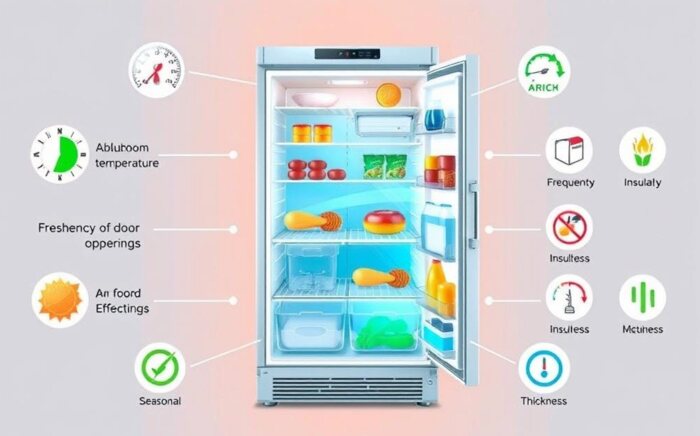Ever thought about how often your fridge should run to keep food fresh and safe? It’s more than you might think. Fridges and freezers work in a special way to keep your food good and save energy.

It’s a myth that your fridge’s compressor should always be on. Actually, it should turn on and off to keep the right temperature. The fridge should be between 37 to 40 degrees Fahrenheit. Freezers should be between 0 to 5 degrees Fahrenheit.
Key Takeaways
- Refrigerators and freezers are designed to operate with the compressor running 80-90% of the time for maximum efficiency.
- The recommended temperature range for a refrigerator is 37 to 40 degrees Fahrenheit, and for the freezer, it’s 0 to 5 degrees Fahrenheit.
- Regular maintenance, such as cleaning the condenser coils and checking the door seals, can help the refrigerator run more efficiently.
- Newer, energy-efficient refrigerators tend to use less energy than older models, potentially saving you money on utility bills.
- Proper food storage guidelines, such as keeping egg salad for 3-4 days and chicken for 1-2 days, can help ensure food safety.
Understanding Refrigerator Operating Principles
To keep food fresh and safe, knowing how your fridge works is key. The fridge uses a complex cycle to keep things cool. This cycle moves a special liquid called refrigerant, which can take in and give out heat well.
Compressor Cycling and Duty Cycles
The compressor is at the heart of this cycle. It’s crucial for the fridge’s work. About 80% of the fridge’s job is making the refrigerant change from liquid to gas.
The compressor then squishes the gas back into a liquid in the condenser. This step is vital for the refrigerant to keep moving and keep the fridge cool.
The way the compressor works, or cycles, affects how well the fridge uses energy. A good fridge will use its compressor wisely to save energy.
| Refrigeration Process Step | Percentage of Total Refrigeration Process |
|---|---|
| Refrigerant Changing from Liquid to Gas (Evaporation) | 80% |
| Refrigerant Compression and Condensation | 20% |
Knowing how your fridge works, like the compressor’s role, helps you make it better. This way, your fridge will use less energy and work more efficiently.
Factors Affecting Refrigerator Run Time
Many things can change how long your fridge runs. This includes the weather, what’s inside, and the fridge’s condition. Knowing these can help your fridge work better and last longer.
The environmental conditions where your fridge sits matter a lot. In very hot and humid places, your fridge might run almost all the time. It has to work hard to keep cool in such heat.
What’s inside your fridge also matters. Adding a lot of warm food makes it run longer. But, an empty fridge needs to run more to stay cool. It should be mostly full for best efficiency.
How often you open the fridge’s door also affects it. Every time you open it, cold air escapes. This makes the fridge work much harder to cool down again, increasing its run time.
| Factor | Impact on Refrigerator Run Time |
|---|---|
| Environmental Conditions | Extreme heat and humidity can increase run time to nearly 100% |
| Refrigerator Load |
|
| Door Openings | Each door opening allows warm air to enter, increasing run time |
By understanding these factors and making changes, you can help your fridge run more efficiently. This keeps your food fresh and safe.

A detailed illustration of a refrigerator with various internal elements like temperature gauges, food items, and airflow patterns. Surround it with visual representations of factors such as ambient room temperature, frequency of door openings, seasonal variations, energy efficiency symbols, and insulation thickness. Use a blend of cool and warm colors to convey the concept of food preservation and freshness.
Your refrigerator should run about 80-90% of the time. This keeps the freezer at 0°F and the fresh food area at 34-40°F. This ensures your fridge works well and keeps food fresh and safe.
Keeping your fridge in good shape is key. Clean the condenser coils, check the door seals, and keep the inside tidy. The temperature setting, room temperature, and how often you open the door also matter.
If your fridge runs less than 35% or more than 85% daily, it might have a problem. A skilled technician can find and fix any issues. This keeps your fridge running efficiently and at the right temperature for your food.
FAQs:
How often should a refrigerator run to keep food fresh and safe?
Refrigerators and freezers run most of the time to keep food safe. They are designed to work 80% to 90% of the time. This makes them more energy efficient.
What are the average operating temperatures for refrigerators and freezers?
Freezers usually run at 0 degrees F. Refrigerators should be between -5 to +8 degrees F in the freezer. The fresh food area should be between 34 to 42 degrees F.
What factors can contribute to increased refrigerator or freezer run time?
Several things can make your fridge or freezer run more. These include living in very hot, humid areas. Also, loading it with warm or hot foods can increase run time.
Having an empty or lightly-loaded freezer can also do it. Frequent door openings, damaged or dirty door seals, and blocked air vents are other factors. Dirty condenser coils and interior lights not turning off when the door is closed can also contribute.
How often should a refrigerator run to maintain proper temperatures?
In most homes, a fridge should run about 80-90% of the time. This ensures the freezer stays at 0°F and the fresh food area at 34-40°F. Keeping your fridge clean and well-maintained can help it run better and last longer.
Should a fridge come on after a power outage?